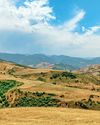
In her blurb for Black River Sonia Faleiro wrote, "it feels completely true". Her book The Good Girls memorably starts with girls suddenly hanging from a tree. Given that yours begins similarly, were you ever tempted to fictionalize fact? Did you keep at bay the horrors or give them room?
When we imagine a writer leaning on the truth, we imagine the incidents that get into the newspapers, or on television. The truth is here to some extent, but there's a difference between a book that's based on reality and one that aims for a kind of truthfulness to what's happening in the world. From 2009 to 2013, when I was working on gender for The New York Times (NYT), I spent a lot of time in places that would never make it to the newspapers these were commonplace where the damage was not violent or egregious enough. But, a family or a survivor was still left completely shattered. Everywhere I went, I was seeing a collective absence. There were these missing girls, who were knocked out of life because of the violence of their times. Munia [from Black River] came out of that. I was seeing the lasting agony of these absences. I think I was struck by being both an intruder on very private grief and a witness to how deeply that grief would go, changing people's lives for years afterwards. You don't get over the death of a child. We because murders, keep searching for justice. Yes, there is the justice of the courts, and there is the justice of knowing, or, as one of the characters in the book tries, to get some kind of acknowledgement. The justice has nothing to do with the absence. And the absence was what I was writing into.
Was journalism, and you're reporting for NYT, an education in novel-writing?
This story is from the {{IssueName}} edition of {{MagazineName}}.
Start your 7-day Magzter GOLD free trial to access thousands of curated premium stories, and 9,000+ magazines and newspapers.
Already a subscriber ? Sign In
This story is from the {{IssueName}} edition of {{MagazineName}}.
Start your 7-day Magzter GOLD free trial to access thousands of curated premium stories, and 9,000+ magazines and newspapers.
Already a subscriber? Sign In

Demonstrators by Krishna Reddy
1968 Multicolour viscosity, Print on paper

Notes from Grief Camp
Every summer, more than a hundred children come together to spend a weekend swimming, climbing and canoeing. They also learn to deal with death

Six Places Cheese Lovers Should Visit
Ancient caves, monasteries, and other must-sees for fromage fans

THE LAND OF SUPERCEN TENARIANS
A remote region of Azerbaijan claims to have many extremely long-lived residents. What is their secret, or is it just a myth?

The Whistle Blowers
My grandparents had a distinctive way of communicating

"THE NEXT AIRCRAFT WILL CRASH ON LANDING"
THE JET WAS ALMOST OUT OF FUEL. THE PILOTS' ONLY OPTION WAS A MANOEUVRE NO ONE HAD EVER ATTEMPTED.

The Secrets in our Genes
Genomic sequencing tests can reveal much about your unique physiology. But are they worth it?

GOOD NEWS FROM AROUND THE WORLD
MENTAL HEALTH When her son was arrested last year, Tambudzai Tembo's mind went to dark thoughts of suicide.

Into the Inferno
A gas station owner has seconds to react when a car crashes into a gas pump

THE CLIMATE CHANGERS
THESE PLACES ARE LEADING THE WAY TO A FUTURE FREE OF FOSSIL FUELS